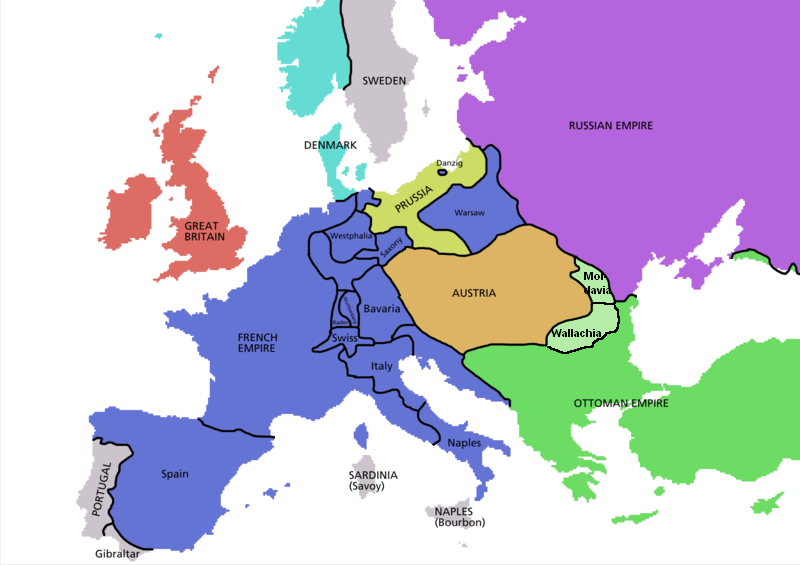Chapters
Napoleon Bonaparte, one of history's most influential figures, rose to prominence during the tumultuous years of the French Revolution and went on to reshape Europe through his military conquests and political reforms. His rule, first as Consul and later as Emperor, marked a period of unprecedented power and influence for France, culminating in the establishment of a vast empire that stretched across Europe.
In this guide, we will explore the key aspects of Napoleon's rule and the zenith of his power.

The Army and Conquest During the Consulate and Empire
Napoleon's military success during the Consulate and Empire was driven by a combination of strategic brilliance, organisational reform, and personal leadership. Under his command, the French army underwent extensive modernization, adopting innovative tactics, training methods, and logistical systems that gave it a significant advantage over its competing countries.
By 1808, Napoleon had established himself as one of the greatest military commanders in history, leading his armies to victory in a series of campaigns across Europe. His ability to outmanoeuvre and defeat larger, more experienced armies earned him a reputation as a military genius and propelled France to the height of its power.
Napoleon was a divisive figure during his leadership of France. An attempt to assassinate Napoleon Bonaparte, known as the Plot of the Rue Saint-Nicaise, was a significant event during his rule as First Consul of France. It occurred on December 24, 1800 (9 Nivôse, Year IX in the French Republican Calendar), as Napoleon was on his way to the Opera to attend a performance with his wife, Joséphine.
The plot was orchestrated by a group of royalists who opposed Napoleon's rise to power and sought to restore the monarchy in France. Led by royalist conspirator Jean-Baptiste Ceracchi and his accomplice, the bomb-maker Aréna, the plot aimed to assassinate Napoleon as he passed through the Rue Saint-Nicaise in Paris.
The conspirators planted a horse-drawn cart loaded with explosives along Napoleon's planned route to the Opera. However, due to a delay in Napoleon's departure and a change in his route at the last minute, he escaped the explosion.
Reasons for Expansion and Building of an Empire
Napoleon's expansionist policies were motivated by a combination of strategic, economic, and ideological factors. He sought to consolidate French power in Europe, weaken his adversaries, and spread the ideals of the French Revolution, including liberty, equality, and nationalism.
Napoleon invaded much of Europe, and his span reached impressive levels. The French Empire is shown here in Blue:

The above is a simplified map, with this map showing more detail on the state of each of the provinces and who was in charge.
As well as taking over neighbouring states, Napoleon had plans to blockade British trade and interfere with the British empire, which was successfully trading through Egypt to the rest of the world. Britain also had a strong presence in the Caribbean, an area that was of interest to the French.
The building of an empire provided Napoleon with a means to secure France's borders, assert its dominance over neighbouring states, and exploit their resources for the benefit of the French economy. However, the rapid pace of expansion also posed challenges, including overextension, resistance from conquered peoples, and the strain of maintaining control over vast territories.
Like many leaders, Napoleon was greedy and wanted to continue taking over more parts of the world.
Control of the Grand Empire
Napoleon's administration of the Grand Empire was led by centralisation, efficiency, and authoritarianism. He implemented a system of prefects, tax collectors, and administrative officials to ensure the smooth governance of conquered territories, while also promoting economic development and social reform.
His economic policies, including the Continental System—a blockade aimed at crippling British trade—sought to strengthen France's economy and weaken its enemies. However, these policies faced resistance from other European powers and caused economic hardship for neutral countries caught in the crossfire.
Challenges to the Empire
Despite his military successes, Napoleon faced numerous challenges to his rule, including the Peninsular War—a guerrilla conflict in Spain and Portugal—and the War of the Fourth Coalition, which saw a coalition of European powers unite against France. The disastrous Russian campaign of 1812, in which Napoleon's Grande Armée suffered heavy losses, marked a turning point in his fortunes and ultimately led to his downfall.
Napoleon's disastrous Russian campaign of 1812 was a military expedition undertaken by the French Emperor Napoleon Bonaparte with the aim of conquering Russia. It is considered one of the most catastrophic military campaigns in history and marked a turning point in Napoleon's fortunes, ultimately leading to his downfall.
The Russian army did not engage and fight the Grande Armée and instead retreated further back into Russia. Napoleon’s troops did not have supplies or networks to support this fight and lost hundreds of thousands of troops. Estimates claim 300,000 French were killed, and 200,000 Russians, during months of bloody conflict and gruelling conditions.
The Collapse of the Empire
The collapse of the Empire came in the wake of Napoleon's defeat in the War of the Sixth Coalition and his forced abdication in 1814. The Treaty of Paris saw France stripped of its conquests.
It was signed on May 30, 1814, between France on one side and the Allies and former targets of France (Austria, Great Britain, Prussia, Russia, Sweden, and Portugal) on the other.
Napoleon was exiled to the island of Elba. However, he would return for one last bid for power during the Hundred Days, before suffering final defeat at the Battle of Waterloo…
The Battle of Waterloo
After escaping from exile on the island of Elba in March 1815 and returning to France, Napoleon quickly regained power and rallied support from his loyalists. His return, known as the Hundred Days, sparked alarm among the European powers, leading to the formation of a coalition to oppose him again.
After escaping from exile on the island of Elba in March 1815 and returning to France, Napoleon regained some of his power and rallied support from his loyalists. His return, known as the Hundred Days, sparked alarm among the European powers, leading to the formation of a coalition to oppose him once again.
As the coalition forces mobilised to confront Napoleon, he moved to strike preemptively, hoping to defeat them individually before they could unite against him. On June 16, 1815, Napoleon's forces crossed the border into modern-day Belgium, aiming to engage and defeat the British and Prussian armies before they could consolidate their positions.
After engaging troops in the morning, the turning point of the battle came in the late afternoon when the Prussian army launched a massive assault on Napoleon's right flank, led by the Prussian III Corps under General Friedrich Wilhelm von Bülow. This unexpected attack forced Napoleon to divert troops from his main assault on the British centre, weakening his forces and disrupting his plans.
As the day wore on and casualties mounted on both sides, Napoleon's position became increasingly precarious. With his army in disarray and the Prussian forces pressing their advantage, Napoleon realised that defeat was inevitable. He ordered a general retreat, abandoning the battlefield and leaving thousands of his soldiers behind as prisoners of war.
Following his defeat, Napoleon abdicated for a second time and was exiled to the remote island of Saint Helena.
Napoleon's Reputation and Legacy
Napoleon's legacy is a complex and contested one. To some, he is a visionary leader and military genius who brought stability, prosperity, and modernisation to France. To others, he is a ruthless dictator and warmonger whose ambitions led to untold suffering and destruction. Regardless of one's perspective, there is no denying Napoleon's enduring impact on Europe and the world, shaping the course of history for generations to come and still being studied and discussed to this day.








